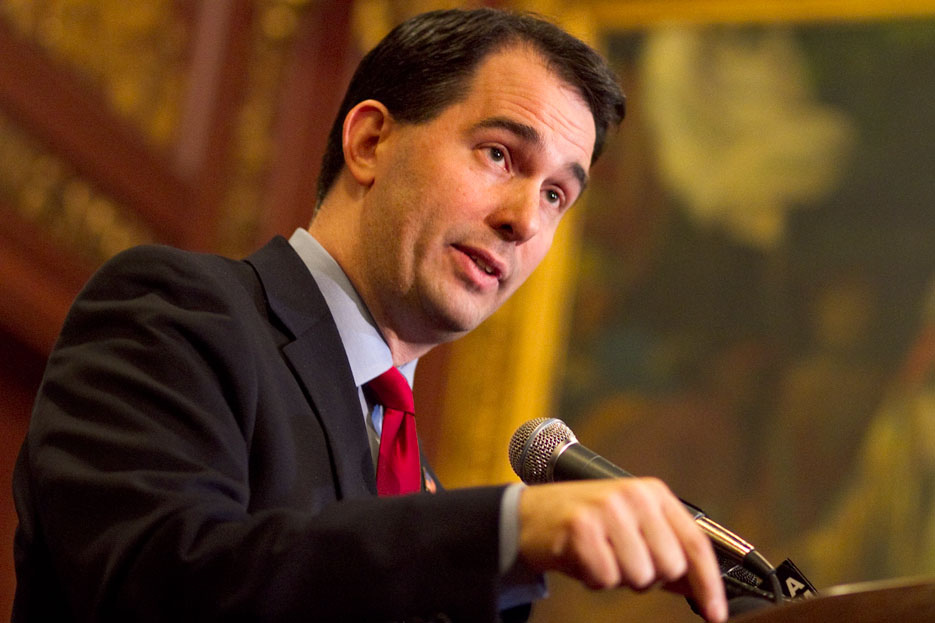
Crossposted on The Daily Beast
Whatever one thinks about Wisconsin Governor Scott Walker and his policies, the decision last week by federal judge Rudolph T. Randa to summarily halt an investigation into alleged campaign finance violations by Walker’s campaign and supporters—and to order prosecutors to destroy all the evidence they collected—was a striking instance of judicial chutzpah. The accompanying opinion (PDF) is laced with ideological rhetoric seeking to undermine many of the remaining campaign finance laws on the books. Even following the Supreme Court’s evisceration of campaign finance law in the Citizens United and McCutcheon decisions, Randa’s ruling is a bridge too far. It should not stand.
2012’s Wisconsin recall election was a $137 million affair. Groups claiming to act independently of any candidate spent more than half of this total, roughly $70 million. Many of them drew their funding from out-of-state “dark money” organizations, which can raise unlimited funds and keep their contributors secret. Under state law, such spending could not be “coordinated” with Walker or another candidate. Whether some of this spending was in fact coordinated—steered at the candidate’s suggestion or with his cooperation—was the question at the heart of the Wisconsin investigation.
Coordination, once the obscure preserve of election lawyers, has become a hot topic. In Citizens United, a narrow majority of the Supreme Court took away from federal, state, and local authorities the ability to place limits on how much corporations, unions and other deep-pocketed interests can spend on elections, as long as they don’t coordinate with candidates—based on the fanciful theory that such “independent” spending cannot corrupt politicians. But the Citizens United majority did reaffirm that it’s perfectly constitutional for the government to limit non-independent spending.
Enter Judge Randa. According to him, only spending on ads containing an unmistakable call to vote for or against someone may be subject to restrictions on coordination. In other words, an advertisement a few weeks before the election saying “Defeat Senator Jones because he won’t stand with the troops,” cannot be coordinated with a candidate. But one saying “Tell Senator Jones to stop hurting the troops,” can be conceived, directed, and promoted by Senator Jones’s political opponent.
Of course, these last-minute “issue advocacy” campaigns, which played a prominent role in the Wisconsin recall, make a mockery of all coordinated spending restrictions—which is the point. Many would find that troubling, but not Judge Randa: “[P]laintiffs have found a way to circumvent campaign finance laws,” he said in his ruling, “and that circumvention should not and cannot be condemned or restricted. Instead it should be recognized as promoting political speech.”
That statement pretty much sums up Randa’s contempt for campaign finance laws. He defends his position by stating that “the people” (and not regulators) must run their government—neglecting to mention that almost all the ads at issue were funded not by “the people” of Wisconsin, but by wealthy out-of-state interests.
Of course, Randa’s not the first to equate “constituents’ with faraway mega-donors—Chief Justice John Roberts did the same thing in the Supreme Court’s recent McCutcheon decision, which struck down overall limits on contributions to federal candidates. So perhaps Randa thinks he’s on solid ground.
He is not. McCutcheon struck down limits on how much a person can contribute to all federal candidates combined; the case left undisturbed limits on contributions to individual candidates, including limits on coordinated spending. Only the Court’s most conservative member, Justice Clarence Thomas, seemed to have an appetite to go after all contribution limits. Tellingly, Randa’s opinion closes with a quote from Thomas, not Roberts. His ruling has already been stayed by a panel of the U.S. Court of Appeals for the Seventh Circuit pending review.
At the end of the day, it is tempting to ask why all of this matters. After all, because of Citizens United, we already have billionaires steering public policy—witness Sheldon Adelson’s recent vow to “spend whatever it takes” to criminalize Internet gambling, the better to squelch competition with his brick-and-mortar casino empire.
As bad as things are, however, they could still get worse. Rules against coordination, when vigorously enforced, preserve at least some separation between politicians and their biggest money backers. Scrapping these rules entirely will give the Sheldon Adelsons of the world yet more power over candidates, officeholders and, by extension, all of us. Even the current Supreme Court seems hesitant to go that far. With any luck, a modicum of sanity will eventually prevail.
(Photo: Wikimedia Commons/Megan McCormick)
